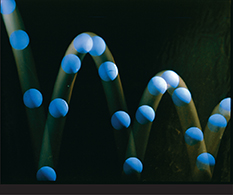Skills Handbook
Science Skills
Basic Process Skills
During a physical science course, you often carry out some short lab activities as well as more detailed experiments. Here are some skills that you will use as you work.
Observing
In every science activity, you make a variety of observations. Observing is using one or more of the five senses to gather information. Many observations involve the senses of sight, hearing, touch, and smell.
Sometimes you will use tools that increase the power of your senses or make observations more precise. For example, hand lenses enable you to see things in greater detail. Tools may help you eliminate personal opinions or preferences.
In science it is customary to record your observations at the time they are made, usually by writing or drawing in a notebook. You may occasionally make records by using computers, cameras, videotapes, and other tools. As a rule, scientists keep complete accounts of their observations, often using tables to help organize their observations in a regular way.
Inferring
In science as in everyday life, observations are usually followed by inferences. Inferring is interpreting an observation or statement based on prior knowledge. For example, you can make several observations using the strobe photograph below. You can observe that the ball is moving. Based on the motion of the ball, you might infer that the ball was thrown downward at an angle by an experimenter. In making that inference, you would use your knowledge about the motion of projectiles. Someone who knew more about projectile motion might infer that the ball loses energy with each bounce. That is why the height decreases with each bounce.

Notice that an inference is an act of reasoning, not a fact. That means an inference may be logical but not true. It is often necessary to gather further information before you can be confident that an inference is correct. For scientists, that information may come from further observations or from research into the work done by others.
Sample Observation |
Sample Inference |
|---|---|
The ball moves less and less vertical distance in the time between each flash of the strobe light. |
Gravity is slowing down the ball's upward motion. |
The ball moves the same distance to the right in the time between each flash of the strobe light. |
Air resistance is so small that it does not slow down the ball's horizontal motion. |
Predicting
People often make predictions, but their statements about the future could be either guesses or inferences. In science, a prediction is an inference about a future event based on evidence, experience, or knowledge. For example, you can say, On the first day next month, it will be sunny all day. If your statement is based on evidence of weather patterns in the area, then the prediction is scientific. If the statement was made without considering any evidence, it's just a guess.
Predictions play a major role in science because they offer scientists a way to test ideas. If scientists understand an event or the properties of a particular object, they should be able to make accurate predictions about that event or object. Some predictions can be tested simply by making observations. For others, carefully designed experiments are needed.




